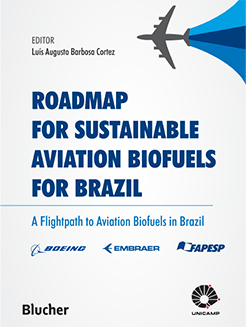
ISBN: 9788521208761
Páginas: 272
Ano da edição: 2014
DOI: 10.5151/9788521208761
Total de downloads: 4.602
Roadmap for sustainable aviation biofuels for Brazil: a flightpath to aviation biofuels in Brazil
Baixar PDF Completo
Part I — Introduction and Context
-
Open Access
PDF - p.19-28
-
Open Access
002 - GOALS AND DESIRES TO THE NEW AVIATION INDUSTRY
PDF - p.29-36
-
Open Access
003 - CURRENT INDUSTRY: PRODUCTS, PROCESSES, SUPPLIERS AND CUSTOMERS
PDF - p.37-49
Part 2 — Needs and Technological Capabilites
-
Open Access
004 - DESIRED PRODUCTS, TECHNOLOGIES OR PROCESSES
PDF - p.53-98
-
Open Access
005 - CRITICAL SYSTEM REQUIREMENTS
PDF - p.99-102
-
Open Access
006 - LARGE TECHNOLOGICAL AREAS
PDF - p.103-114
-
Open Access
PDF - p.115-126
-
Open Access
008 - CURRENT SCIENTIFIC AND TECHNOLOGICAL CAPABILITIES
PDF - p.127-130
-
Open Access
PDF - p.131-180
Part 3 — Technology Development Strategy
-
Open Access
PDF - p.183-200
-
Open Access
011 - ANALYSIS OF IDENTIFIED PATHWAYS
PDF - p.201-206
-
Open Access
012 - INSTITUTIONAL ISSUES ON AVIATION BIOFUELS
PDF - p.213-216
-
Open Access
013 - R&D PROGRAMS AND COMMERCIALIZATION GAPS
PDF - p.217-218
-
Open Access
PDF - p.219-226
Back matter
-
Open Access
PDF - p.227-237
-
Open Access
PDF - p.239-250
-
Open Access
017 - ANNEX 1 - REGIONALS OUTREACHES
PDF - p.251-264
-
Open Access
018 - ANNEX 2 - STAKEHOLDERS COMMENTS
PDF - p.265-272
Introduction
-
Open Access
PDF - p.1-18
The aviation industry is committed to reducing its environmental impact and has established the ambitious goals to reach carbon neutral growth by 2020 and to reduce carbon dioxide emissions by 50% (from 2005 levels) by 2050. Currently, the aviation industry generates approximately 2% of man-caused carbon dioxide emissions; it is a small but growing share that is projected to reach 3% by 2030.
BOEING and EMBRAER, as leading aviation companies committed to a more sustainable future, have joined efforts to support initiatives to lower greenhouse gas (GHG) emissions derived from air transportation. These emissions represent an important global concern in the 21st century, and the growing aviation industry will need to find ways to reduce its contribution, particularly in substituting fossil fuels by sustainable biofuel.
Airlines are doing their part as well. Globally, they have created the Sustainable Aviation Fuel Users Group (SAFUG), an organization focused on accelerating the development and commercialization of sustainable aviation biofuels and representing about 30% of commercial jet fuel demand.
Brazil is internationally recognized for its long experience of using biomass for energy purposes beginning with wood, sugarcane ethanol, and biodiesel. Modern bioenergy represents around 30% of the Brazilian energy matrix, and has a long track record reconciling biofuel production, food security and rural development. Much of what Brazil has done in the bioenergy area was accomplished by long-term policies and investment in research and by building up human capacity.
In this context, BOEING, EMBRAER and FAPESP initiated this project to conduct a national assessment of the technological, economic and sustainability challenges and opportunities associated with the development and commercialization of sustainable biofuel for aviation in Brazil. UNICAMP was selected for the coordination of this study, with the charter to lead a highly qualified, multi-disciplinary research team. The project team conducted eight workshops with active participation of over 30 Stakeholders encompassing private sector, government institutions, NGOs and academia. The assessment included the most important topics from agriculture, conversion technology, logistics, sustainability, commercialization and policies. The result of this effort is this Flightpath to Aviation Biofuels in Brazil originated from the open dialogue and diverse views of the Stakeholders in a consensous manner. The report lays out the grounds to establish a new biofuels industry to replace jet fuels. In the process, we confirmed that Brazil is a place of great promise to help the world to alleviate fossil fuel dependence in aviation.
The development of a new industry will entail the participation of different sectors of the Brazilian economy including not only research institutions and biofuels producers but also feedstock producers, financial, international relations, academia, the aviation industry, and environmental and social advocacy groups. In developing sustainable aviation biofuels Brazil is seen as a key player, having a unique strategic advantage worldwide.
